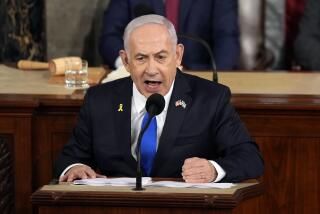Arms Sale to Iran Depleted Spare Parts
- Share via
WASHINGTON — The Administration’s secret sale of Hawk missile spare parts to Iran wiped out the U.S. stocks of 15 types of parts and significantly reduced the supplies of many others, the congressional committees investigating the Iran- contra affair disclosed Tuesday.
Adm. William J. Crowe Jr., chairman of the Joint Chiefs of Staff, told the House and Senate panels that the Pentagon’s regular channels were bypassed in making the sale, which the White House had decided was “not a military matter.”
In fact, he said, the military’s top uniformed leaders did not even know about the deal for five or six months after President Reagan approved it.
Although Crowe said the sale had only a negligible effect on U.S. combat readiness, his account provided another insight into how the arms shipments were carried out by a small group within the White House, operating as what panel member Sen. Paul S. Sarbanes (D-Md.) has termed “a junta.”
The admiral, whose testimony was taken behind closed doors last June and released Tuesday, said he believed that Administration officials did not consult their in-house experts before sending the parts to Iran in May, 1986.
They apparently opted for secrecy “to keep dissent out of the decision-making calculus,” he said. Moreover, he said, he doubted that the National Security Council staff did a hard analysis of the impact the parts would have on the Iran-Iraq War.
“I suspect their judgment was an intuitive one, not an analytical one,” Crowe told the committees.
Although these actions violated many of the basic principles that apply to such situations, Crowe defended them, noting that they were taken with Reagan’s approval. “Please understand that the commander-in-chief, if he is playing for stakes he feels justify something like that--you can rationalize a move like that,” he said.
“You don’t want to put it in a cut-and-dried light.”
He said the parts had “no measurable impact” on Iran’s military strength in the gulf war.
Nonetheless, Crowe noted that he had been “startled” upon learning about the sale after it occurred and confronted Defense Secretary Caspar W. Weinberger.
The defense secretary “told me that he had known about it for some time and that he had opposed it and that the decision had been made by the President . . . that it was not a military matter,” Crowe said.
He said he and Weinberger agreed “that the commander-in-chief of the United States can do what he wants to do. That is within his purview.”
But Crowe noted: “Whether it is wise or not is a separate question.”
Committee staff members quoted an Army inspector general’s report as saying that the sale, which involved 234 types of spare parts, wiped out 15 types of parts and heavily depleted 46 more.
“I found that rather, that is, a rather significant finding, that . . . should have been flagged,” Crowe said. The parts were transferred from Defense Department inventories to the Central Intelligence Agency.
John Saxon, a Senate committee staff member, noted that, had the assessment been made on another day, fluctuating inventories might have shown a picture that was “not that alarming, but at the time the decision was made to make that transfer, those were the numbers that they were looking at.”
More to Read
Sign up for Essential California
The most important California stories and recommendations in your inbox every morning.
You may occasionally receive promotional content from the Los Angeles Times.










